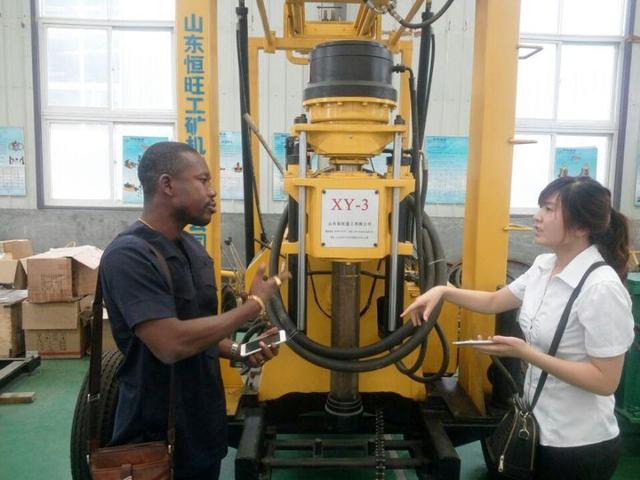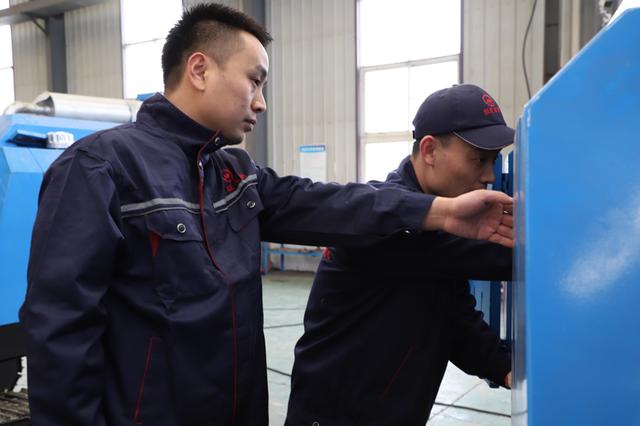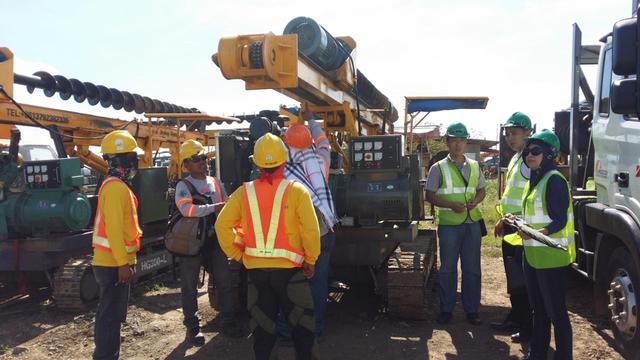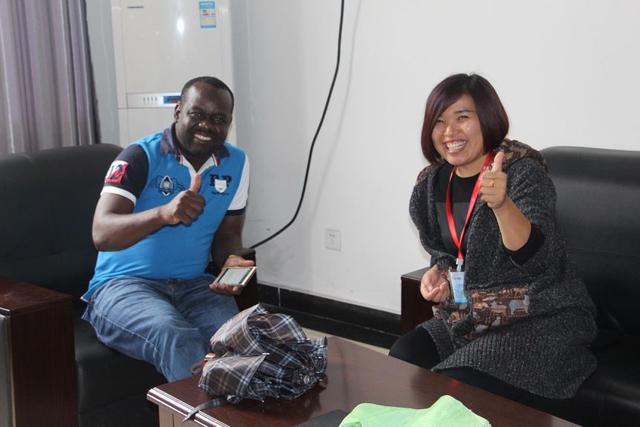Kups grew up in the slums of Kenya. As a child, there was no well near his home, so he used to get up before dawn every day to fetch water from a reservoir with his uncle Festus. They would then sell the water, hauled in a cart, throughout the slums.
The water from the reservoir was unclean, yet it was Kups' drinking and washing water throughout his childhood. By selling water, Kups was able to attend a high school that was out of reach for most children in his situation. In 2015, he even got admitted to a university in Tianjin, China.
In China, Kups met Liu Mingtao, a drilling machine merchant. Liu Mingtao specially manufactured a customized drilling machine for Kups' uncle Festus. This drilling machine helped solve the drinking water issues for dozens of villages in Kenya and enabled Uncle Festus to establish his own company. Today, Festus employs over a dozen well drillers and has become a local celebrity.

The Rise of Mining Machines
Liu Mingtao's youth was spent on construction sites in his hometown of Jining. At 15, he worked as a cement mason on construction sites, earning 10 yuan a day. It was there that he first encountered machinery – excavators, bulldozers, and drilling machines, which he found fascinating.
In the 1950s, Jining saw its first wave of enterprises starting to produce mechanical products, beginning with simple car wheels and steel rims. Over a decade of transformation, they gradually began to manufacture complete mechanical products.
During the following decade, the golden era of coal, the soaring coal prices made many coal bosses rich overnight just by purchasing a mining machine. With the rise of the coal industry, the demand for mining machines in Jining increased significantly, boosting the local mining machine industry.
By around 2010, there were over 200 mechanical manufacturing enterprises in Jining, with mining machines being the most popular. At 23, Liu Mingtao saw a business opportunity and decided to start his own venture selling mining machines, focusing on online sales.
He collaborated with a local manufacturer in Jining and opened a store on 1688, listing the mining machines for sale.
When Liu Mingtao first opened his store, there weren't many similar shops on the platform. He proactively contacted coal mining engineering teams across the country and persuaded them to place orders.
Most customers were coal mining engineering team bosses from Shanxi and Shaanxi. Having made money in the mines, they would continue to contract mines and buy more mining machines. A boss from Yulin, Shaanxi, even ordered over 20 mining machines from Liu Mingtao in one go.
In the first year, Liu Mingtao was still borrowing money to support his shop, but by the second year, he had made a net profit of over 200,000 yuan. He used the earnings to buy a house and a car in Jining city and hired several purchasing agents, financial staff, and salespeople. His small company, now fully staffed, saw its annual sales exceed 10 million yuan.

However, this only lasted for 2 years. In 2014, after the New Year, Liu Mingtao felt that "mining machinery was no longer easy to sell." The news frequently reported on the decline of coal mines. "70% of the coal mines in the country were closing down."
Liu Mingtao's store was impacted. Customers who were purchasing mining machines last month were changing industries the next month.
Over six months, Liu Mingtao lost 80% of his clients. Eventually, he had to sell his car to pay his employees. During that time, he would contact new clients during the day and lie in bed at night pondering his next move.
He thought of two options: either give up everything and return to his village, or leave the mining machine industry. He quickly dismissed the first option, "Having bought a house and settled in the city and experienced the taste of making millions in sales, it would be too big a change to suddenly return to the village."
But if he didn't sell mining machines, what could he sell? Liu Mingtao was still pondering.
China's Aid to Africa Team
Considering the risks, Liu Mingtao decided that even if he left the mining machine industry, he would stay in the machinery sector. "Transitioning to similar products would be less costly."
Just as Liu Mingtao was worried, a representative from Alibaba's international site visited him. Liu Mingtao began to pay attention to foreign markets, browsing international websites every day to find market needs.
One day, he saw in the news that Africa was severely lacking water. Often, over a dozen villages would share one well. In many African villages, digging wells could only be done by hand. Dozens of villagers would contribute to digging a well using hoes and shovels. People would jump into the pit and desperately shovel out the earth. Sometimes, after a month of digging tens of meters deep, the small amount of well water would be instantly contaminated by soil.
"More often, they had no wells and had to drink polluted water from rivers." Once, while browsing foreign websites, Liu Mingtao came across a heartbreaking story. An African woman had walked all day with a bucket to a river tens of kilometers away.
In the unclear river, a crocodile lurked. As the woman bent over to scoop water, the crocodile leaped up, bit her arm, and dragged her into the river. Liu Mingtao decided to remove the mining machines from his store. He opened a shop on Alibaba's international site and found a drilling machine manufacturer in Jining, switching to selling drilling machines.
Around 2014, China's construction aid to Africa was booming. Many domestic engineering teams went to Africa to support railway construction and infrastructure, including well drilling. Liu Mingtao's first batch of drilling machines sold to Africa was to the Chinese aid team.
In 2014, an engineering group from Fuzhou undertook an aid project in Nigeria. The task assigned to the team leader, Cheng Qiang, was to build roads in the Nigerian mountains and help local villagers dig wells. "The time frame was 2 years."
Having no experience in well drilling, Cheng Qiang and his workers had to learn how to operate the machinery and the methods of well drilling. He saw Liu Mingtao's drilling machine promotion in his online shop. After communicating with Liu Mingtao, Cheng Qiang even visited his factory to learn well drilling techniques with the technicians.
Half a year later, Cheng Qiang and his workers arrived in Nigeria, and Liu Mingtao's drilling machine, shipped by water to Africa, soon arrived.
In the Nigerian villages, Cheng Qiang and his workers were treated like heroes. Villagers who previously had to travel tens of kilometers to get water could now access clean water right at their doorsteps. They offered their most precious potatoes and palm wine to thank these guests from China.

African Well Drilling Teams
Later, many locals in Africa found Liu Mingtao on the international site. They wanted to purchase Chinese drilling machines and establish their own well-drilling teams.
When Kups was in his second year of university, his uncle told him that he wanted to establish a well-drilling team to earn money by helping others drill wells. Coincidentally, Kups had seen an advertisement for excavators from Shandong, China on TV.
On Alibaba's international site, Kups met Liu Mingtao. Liu Mingtao had a factory produce a modified drilling machine, "removing some parts that Africans wouldn't use, saving quite a bit of cost."
Half a year later, Liu Mingtao sent two technicians with the drilling machine to Nairobi to meet Festus.
Festus no longer sold water. He had become a local contractor, leading several young people to drill wells around Nairobi.
Over the next two years, Festus purchased two more drilling machines from Liu Mingtao. He also established his own company, hired over a dozen well drillers, and helped solve the drinking water problems for dozens of villages in Kenya. He even became a local celebrity and was invited to work for the government.

Two years ago, a government agency in Nigeria ordered a drilling machine from Liu Mingtao's shop. They used this drilling machine to drill several wells in Nigeria, and six months later, they ordered another one.
Now, Africa is Liu Mingtao's largest market. Every year, he exports over 200 drilling machines to Africa.
"Every drilling machine sold helps at least one African village solve its drinking water problem." Liu Mingtao likes to think this way. Through Alibaba's international site, Liu Mingtao has met many African customers over the years.
(Source: Today's Headlines, Author: Taobao Shenren)
Please fill out the form below according to your needs, and a Hengwang product specialist will contact you within one day.